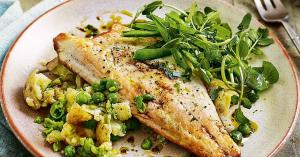Scientists Globally Confirm Theory of an 'Anti-Viral Diet', Establish That What We Eat Can Improve Vaccine Effectiveness

Recent Food Science has Established the Immunomodulatory and Anti-Viral Properties of Scores of Dietary Ingredients
Researchers and Medics Have Corroborated Theory of a Diet that Increases Vaccine Efficacy, Enhances Human Immune Response and Deters a Broad Spectrum of Viruses
Regarding the effects of diet on disease, it is known that healthy, balanced nutrition has greater impact on immunity to viruses than any single vaccine. Science has proven it beyond a shadow of doubt”
CITY OF LONDON, LONDON, UNITED KINGDOM, April 4, 2022 /EINPresswire.com/ -- It turns out that a specific group of micronutrients have been identified that increase the responsiveness of people's immune systems to COVID-19 vaccines, especially in the case of the elderly. Philip Calder, Professor of Nutritional Immunology at the University of Southampton, and Margaret Rayman, Professor of Nutritional Science at the University of Surrey, submitted the document 'Optimising COVID-19 Vaccine Efficacy by Ensuring Nutritional Adequacy' to UK parliament last year, which was ultimately published in the 'British Journal of Nutrition' (28th December 2021) https://www.ncbi.nlm.nih.gov/pmc/articles/PMC7884658/ - print and online.— Edouard d'Araille, Project Lead - 'The Anti-Viral Diet Research Project'
The professors there describe that: "An effective immune response requires an adequate host nutritional status. In recognising this, the European Food Safety Authority has authorised nutrient function health claims for vitamins A (including β-carotene), B6, B9 (folate), B12, C and D, and the minerals Zn, Se, Fe and Cu based on scientific assessment of their contributions to the normal functioning of the immune system". They then go on to observe that: "In surveying the literature in this field, it appears that vitamins C, D and E together with Zn and Se are needed by the immune system in excess of amounts that can usually be achieved through diet alone. As an example, Se status above that required for optimal selenoprotein function has been associated with better cure rate from COVID-19".
This appears to be good news, for it means that there may be something that can be done - apart from the taking of repeated booster shots - in order to increase human immune defenses against the Coronavirus and other viral threats. Professors Rayman and Calder draw a firm conclusion from decades of evidence in stating that "immune impairments have been linked to poor vaccine responses" and their important evidentiary review - aimed at influencing the UK's public health policies - underlines that: "A cause-and-effect relationship between micronutrient status and vaccination responses has been demonstrated through randomised controlled trials. Such trials in older people have shown better responses to vaccination after an intervention". They suggest that "a nutritional supplement (e.g. containing vitamins A, B6, B9, B12, C, D and E and the minerals Zn, Cu, Se and Fe) should be provided free of charge to all those aged over 70 years for a period of weeks before and after they receive the vaccine" as the scientific evidence supports such a measure optimizing the human immune response.
London-based research institute The Academy of the Third Millennium has been conducting investigations into the immune-enhancing and antiviral properties of over fifty dietary ingredients during the past two years, through the project 'AVD: The Anti-Viral Diet'. The relationship between certain foods and increased levels of immunity against numerous viruses appears to have been established by a wide range of food science research. The identification of vitamins and minerals as having significant effects on the immune system now appears to be a generally accepted conclusion. However, the antiviral effects of many other ingredients have also been firmly corroborated.
Professor Jean Bousquet, Honorary Professor of Pulmonary Medicine at Montpellier University and Former Chair of GINA (Global Initiative for Asthma), ARIA and the WHO Global Alliance against Chronic Respiratory Diseases, has identified the ingestion of fermented foods as being closely correlated with low levels of COVID-19. Already in 2020, in 'Clinical and Translational Allergy', Professor Bousquet remarked upon large differences in COVID-19 death rates existing between countries, even between regions of the same country. Low death rate countries - such as Eastern Asia, Central Europe and the Balkans - turn out to have one common feature: that of eating large quantities of fermented foods. "When modern life led to eating reduced amounts of fermented foods, the microbiome drastically changed and this may have facilitated SARS-CoV-2 to spread or become more severe", writes Professor Bousquet, going on to say that: “Nutrition may therefore play a role in the immune defense against COVID-19 and may explain some of the differences seen in COVID-19 across Europe”.
A broad base of scientific data, provided in the official report on 'AVD: The Anti-Viral Diet' (now published in its 4th Edition), seems to prove that 'dietary antivirals' exist, some of which work in similar ways to pharmaceutical antivirals. For example, it emerges that a common flavonoid chemical called 'Rutin' - found in apples, plums, buckwheat and many other foods - has been shown to have anti-viral properties against SARS-CoV-2 which exceed even those of ritonavir, a medicinal antiviral. This is of significance, as ritonavir is one of the two antivirals that are combined together in Pfizer's recent oral antiviral COVID pill 'Paxlovid' which, after successful trials last year, was announced as having: "reduced risk of hospitalization or death by 89%" and has been approved for emergency use. Head-to-head testing of the anti-viral efficacy of Rutin against Paxlovid has not yet been undertaken, though Rutin has been a widely used natural anti-viral pill in China for decades and has been utilized as part of treatment during the current pandemic.
Professor Shilin Chen, Director of the WHO Center in China, who has led a vast amount of research into natural ingredients that are capable of having an impact on COVID-19, writes that: "It is necessary to disseminate the many advantages of traditional medicines for the prevention and treatment of COVID-19. Bridging the gap between traditional and conventional medicine during this global COVID-19 spread is both timely and crucial". The problem is that knowledge about the antiviral and immune-enhancing effects of numerous dietary ingredients has not yet reached the wider public.
The Fourth Edition of 'AVD: The Anti-Viral Diet' by Project Lead Edouard d'Araille, shares the results of research from over 2000 scientists - most of whose work is peer-reviewed - in corroboration of anti-viral foods that are capable of increasing our immunity to COVID-19 and other viral illnesses. This new edition of the 'AVD' report contains over 300 additional pages of supplementary evidence, updating the scientific research to 2022, especially regarding ingredients effective against SARS-CoV-2. The US Color Hardback of 'AVD' is available now (ISBN 978-1-908936-44-8) at http://AVD.Today.
Ewald Oersted
LTG™ Health News
+44 333 090 4848
email@AVD.Today


